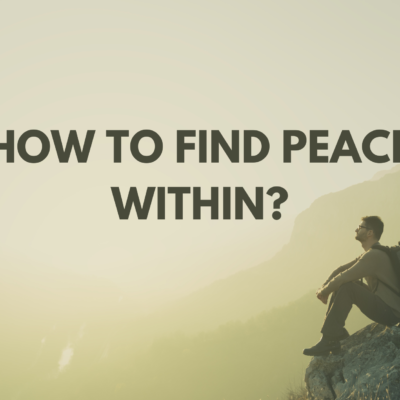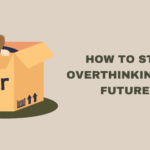How to Find Peace Within: In today’s fast-paced world, where stress and chaos dominate our lives, finding inner peace has become more important than ever. True peace does not come from external circumstances; rather, it is a state of mind cultivated through self-awareness, acceptance, and mindful practices. This article explores practical ways to discover and nurture inner peace, allowing you to lead a more fulfilled and balanced life.
Also Read:
- How do I Stop Caring About What Others Think?
- How to Make Someone Happy?
- How to Stop Overthinking Situations?
Understanding Inner Peace
Inner peace is a mental and emotional state of calmness, free from anxiety, fear, and turmoil. It does not mean a life without problems but rather the ability to remain stable and composed despite external challenges. Achieving this level of tranquility requires self-discovery, emotional regulation, and a conscious effort to let go of negativity.
How to Find Peace Within?
1. Practice Mindfulness and Meditation
Mindfulness and meditation are powerful tools to cultivate inner peace. Mindfulness involves being fully present in the moment, observing thoughts without judgment, and embracing experiences as they are. Meditation helps in quieting the mind, reducing stress, and enhancing self-awareness.
- Daily Practice: Set aside at least 10–15 minutes daily to meditate. Focus on your breath, a mantra, or a visualization.
- Mindful Living: Engage in daily activities with full awareness—whether eating, walking, or conversing.
- Benefits: Improves emotional well-being, lowers stress, and enhances clarity of thought.
2. Let Go of the Past
Many people struggle to find peace because they hold on to past regrets, mistakes, or traumas. Accepting that the past cannot be changed and choosing to learn from it is crucial for inner harmony.
- Forgiveness: Forgive yourself and others to free yourself from resentment.
- Acceptance: Embrace your past as a part of your journey, rather than a defining factor.
- Moving Forward: Focus on what you can control and shape a positive future.
3. Cultivate Gratitude
Gratitude shifts your perspective from what is lacking to what is abundant in your life. Recognizing the blessings, no matter how small, fosters contentment and peace.
- Gratitude Journal: Write three things you’re grateful for every day.
- Express Appreciation: Show gratitude towards people who positively impact your life.
- Mindset Shift: Instead of dwelling on problems, focus on what is going well.
4. Simplify Your Life
A cluttered life—whether physically, mentally, or emotionally—leads to stress and restlessness. Simplifying life helps in focusing on what truly matters.
- Declutter Your Space: A tidy environment promotes mental clarity.
- Prioritize Essential Tasks: Avoid overcommitting and focus on tasks that align with your values.
- Disconnect from Noise: Reduce unnecessary social media and digital distractions.
5. Connect with Nature
Spending time in nature has a profound effect on mental well-being. The serenity of natural surroundings helps in calming the mind and rejuvenating the soul.
- Take Nature Walks: Walk in a park, forest, or near water bodies.
- Practice Grounding: Walk barefoot on grass or sand to feel connected to the earth.
- Breathe Fresh Air: Engage in deep breathing exercises in natural surroundings.
6. Develop Healthy Relationships
The people you surround yourself with influence your peace of mind. Positive relationships uplift your spirit, while toxic ones drain your energy.
- Set Boundaries: Learn to say no to people who disrupt your peace.
- Surround Yourself with Positivity: Choose relationships that bring support and encouragement.
- Communicate Openly: Resolve conflicts calmly rather than suppressing emotions.
7. Practice Self-Compassion
Being kind to yourself is crucial for inner peace. Negative self-talk and self-criticism create inner turmoil, while self-love fosters a sense of security and acceptance.
- Acknowledge Your Worth: Recognize your strengths and accept your flaws.
- Be Gentle with Mistakes: Treat yourself with the same kindness you would offer a friend.
- Prioritize Self-Care: Engage in activities that nourish your body, mind, and soul.
8. Embrace a Spiritual Practice
For many, spirituality plays a key role in finding peace. It provides a sense of purpose and a deeper understanding of life’s journey.
- Prayer and Reflection: Spend time connecting with your faith or beliefs.
- Read Spiritual Texts: Gain wisdom from books and teachings that resonate with you.
- Seek Meaning: Understand your purpose and live in alignment with your values.
9. Engage in Creative Activities
Creative expression allows you to release emotions, reduce stress, and bring joy into your life.
- Art and Music: Painting, drawing, playing an instrument, or singing can be therapeutic.
- Writing and Journaling: Express thoughts and emotions through words.
- Hobbies and Crafts: Engage in activities that bring fulfillment and joy.
10. Focus on the Present Moment
Worrying about the future or ruminating on the past robs you of peace. Learning to live in the present allows you to experience life fully.
- Mindful Breathing: Whenever you feel anxious, take deep breaths and focus on the present.
- Engage Fully: Be fully involved in whatever you do rather than multitasking.
- Let Go of Control: Accept that not everything can be controlled, and trust the flow of life.
Conclusion
Finding inner peace is a continuous journey that requires self-awareness, conscious choices, and daily practices. By embracing mindfulness, letting go of negativity, cultivating gratitude, and simplifying life, you can create a serene and balanced state of mind. True peace lies within you—it is up to you to nurture and embrace it.








